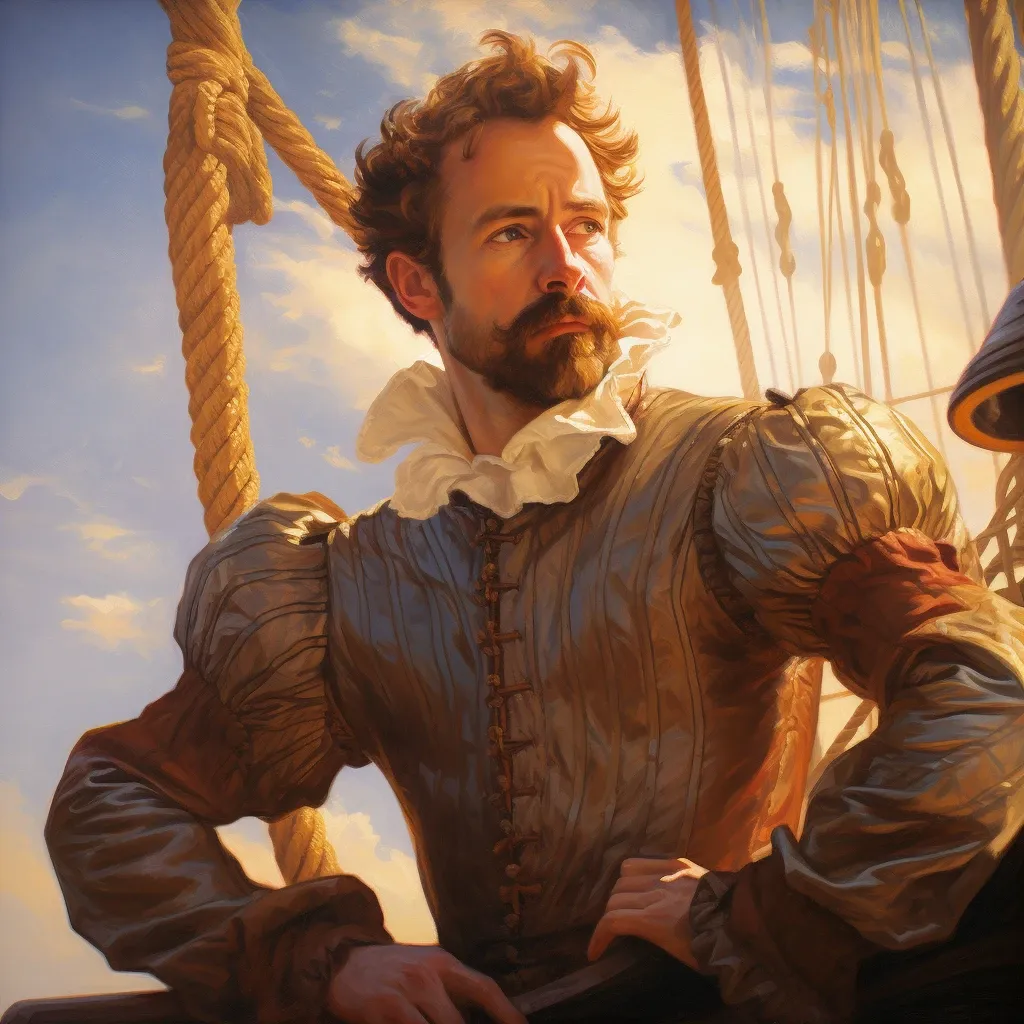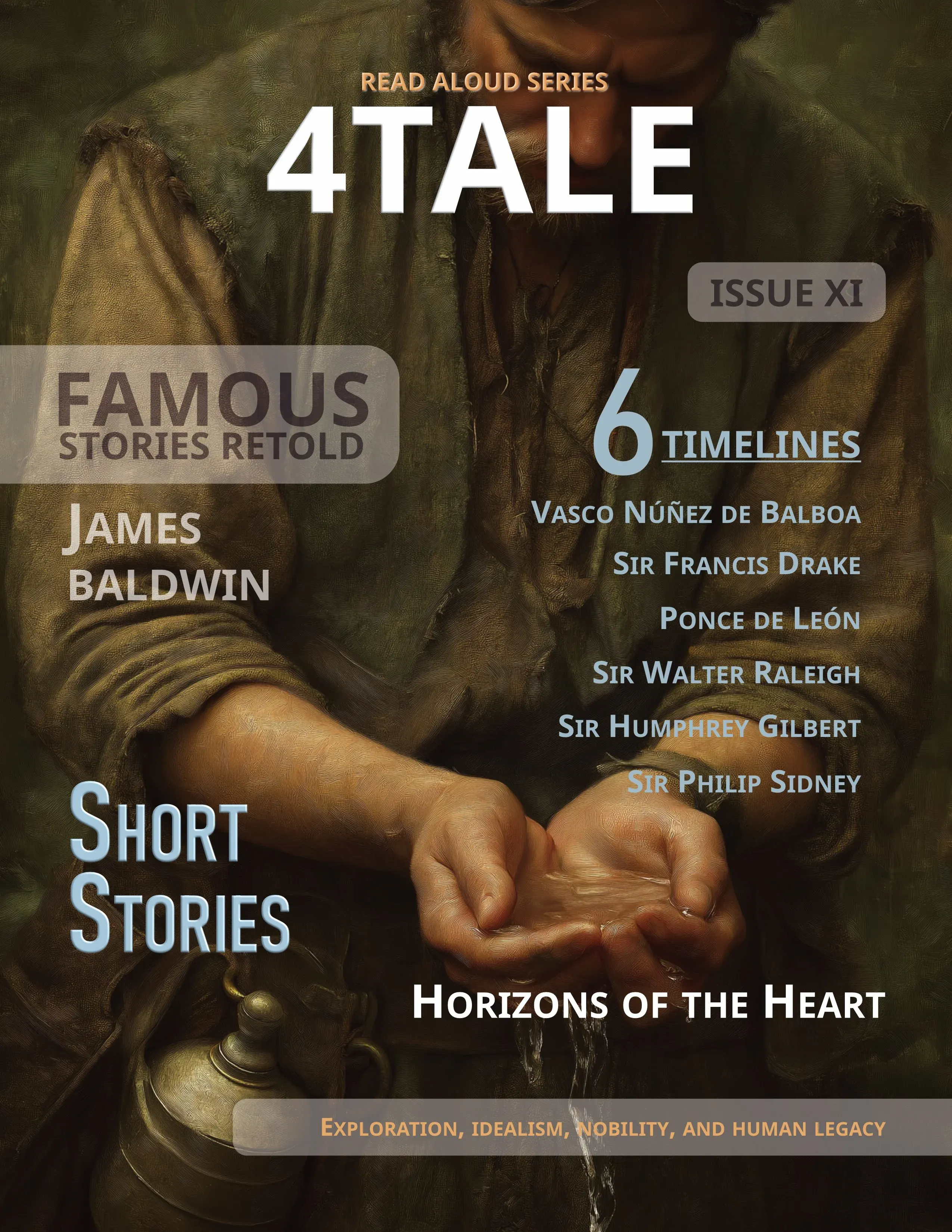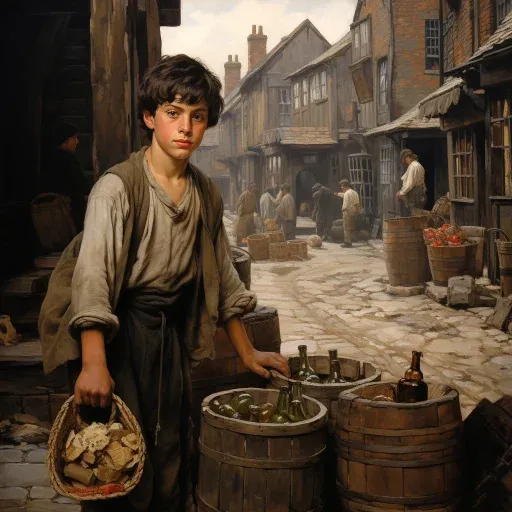BY JAMES BALDWIN
Sir Walter Raleigh
Famous Stories Retold: Story 16 of 50

Heading

Exploration: He made several attempts to establish colonies in America and introduced the potato and tobacco to England.
Favor and Downfall: Initially favored by Queen Elizabeth, he eventually fell out of favor, was imprisoned, and later executed.
A good book we like, we explorers. That is our best amusement, and our best time killer
- Roald Amundsen, Explorer
Sir Walter Raleigh: The Man behind England's Potatoes and Tobacco
Venture back in time as we explore the remarkable life of an English gentleman, Sir Walter Raleigh. This tale is not only of bravery and nobility but also of the significant contributions he made to English society. Known for his chivalry, Raleigh's story is filled with intrigue as he brought back two items that would forever change England - the potato and tobacco. Join us as we delve into the life of this fascinating figure and his intriguing discoveries that continue to impact us to this day.
The Early Life of Walter Raleigh
Born into nobility in Devon, England, Walter Raleigh was a man of many talents. He was a writer, poet, soldier, politician, courtier, spy, and explorer. He was an adventurous soul from a young age, always eager to learn and explore. Raleigh was educated at Oxford and later studied law in London. His youthful years were marked by a spirit of exploration, an attribute that would play a significant role in his later life. Even as a child, he exhibited the qualities of bravery and nobility that would earn him a place in the annals of history.
Raleigh's Notable Encounter with Queen Elizabeth
A pivotal moment in Raleigh's life was his encounter with Queen Elizabeth I. The story goes that he was walking along a unpaved, muddy street in London when he saw the Queen approaching. A large puddle lay between the Queen and the other side of the street. Displaying his chivalry and quick thinking, Raleigh removed his expensive scarlet cloak and laid it over the muddy puddle, allowing the Queen to cross the street without soiling her shoes. This act caught the Queen's attention, which marked the beginning of Raleigh's close relationship with the royal court.
Podcast
The Knighthood of Walter Raleigh
After the notable encounter, Queen Elizabeth was so impressed by Raleigh's show of chivalry that she invited him to the palace. It was there, surrounded by the finest ladies and gentlemen of England, that she bestowed upon him the title of knighthood. From that moment onward, he was known as Sir Walter Raleigh. The Queen's favor opened doors for Raleigh, allowing him to embark on numerous expeditions to the New World and make numerous contributions to England's knowledge and culture.
Raleigh's Expeditions to America
Sir Walter Raleigh's spirit of adventure led him to the vast unknown territories of the New World. Accompanied by his half-brother, Sir Humphrey Gilbert, Raleigh embarked on his first voyage to America. The courage and determination of these men were evident in their pursuit of establishing a settlement in the foreign land.
However, their ambitious endeavors met with considerable obstacles. The men were confronted by the harsh realities of the American wilderness, including expansive forests, formidable wild beasts, and intimidating native tribes. Some of Raleigh's men succumbed to the harsh conditions, while others managed to return to England.
Despite the repeated failures and losses, Raleigh's ambition remained steadfast. However, after numerous unsuccessful attempts, he eventually ceased his efforts to establish a settlement in America. His endeavors, though not entirely successful, were indicative of the adventurous spirit and relentless determination that defined him.

The Introduction of Potatoes to England
In his voyages to America, Raleigh discovered a crop that was unknown in his homeland of England - the potato. He observed the native tribes using this vegetable as a staple food item. Intrigued by the versatility and nutritional value of this plant, Raleigh transported a few potatoes back to England.
He planted them in Ireland, where they thrived in the local soil, debunking the misconception that these vegetables could only grow in the New World. This simple act of introducing the potato to England had a profound impact on the nation's agricultural and culinary landscape. Today, it's hard to imagine British cuisine without the humble potato, and this can largely be credited to Raleigh's foresight and ingenuity.
The Advent of Tobacco Use in England
Among the many novelties that Raleigh encountered in the New World was the use of tobacco, a plant native to America. He witnessed the indigenous tribes smoking the leaves of this plant, a practice that was completely alien to the English at the time.
Raleigh decided to introduce this habit to England and began smoking tobacco himself. This new practice initially sparked curiosity and even concern among his countrymen, as evidenced by the incident with his servant who mistook the smoke for fire. However, over time, tobacco use became widely accepted and even popular.
While the health implications of tobacco use are now widely recognized, its introduction by Raleigh marked a significant cultural shift in England and eventually, the rest of the world.
Conclusion
Sir Walter Raleigh's gallantry and adventurous spirit led to the introduction of potatoes and tobacco to England. While his attempts to establish settlements in America may have been fraught with challenges, it was through these expeditions that he stumbled upon these two significant discoveries. Raleigh's influence, therefore, extends beyond his famed encounter with Queen Elizabeth and his knighthood. His story serves as a testament to the profound ways in which cross-cultural exchanges can shape societal norms and preferences, as evidenced by the enduring popularity of potatoes and tobacco in England and beyond.





